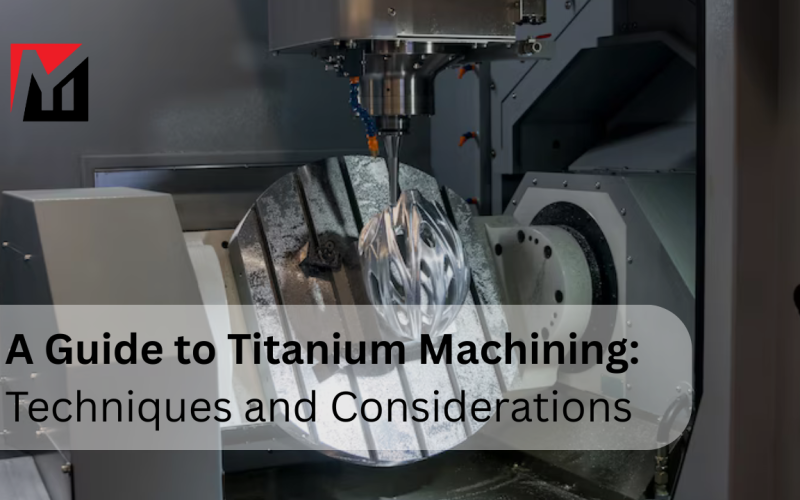At MyT Machining, we specialize in delivering high-performance CNC services for industries that require precision, durability, and innovation. Among the most advanced processes we offer is titanium machining—a specialized manufacturing solution designed to meet the challenges of working with one of the toughest and most valuable metals in modern engineering. This article will explore the significance, techniques, and benefits of titanium machining, giving you a comprehensive understanding of how it supports high-stakes applications across various sectors.
What Is Titanium Machining?
Titanium machining involves the precision shaping and cutting of titanium metal using tools such as CNC mills, lathes, and turning centers. Due to titanium’s unique material characteristics—lightweight, strong, corrosion-resistant, and biocompatible—machining it requires specialized techniques, tooling, and expertise.
Titanium is used in applications where failure is not an option: aircraft engines, medical implants, high-performance vehicles, and military systems. Its strength-to-weight ratio and resistance to heat, wear, and corrosion make it an ideal choice for these critical applications.
Why Titanium Is a Premium Material for Machining
Titanium offers a rare blend of properties that make it uniquely suited to extreme environments. Titanium machining is a sophisticated process that requires expert handling, advanced CNC technology, and in-depth material knowledge. As industries continue to demand stronger, lighter, and more corrosion-resistant components, titanium stands out as a premier material. With the right partner—like MyT Machining—manufacturers can fully leverage the advantages of titanium while maintaining cost efficiency and consistent part quality.
1. Exceptional Strength-to-Weight Ratio
Titanium is nearly as strong as steel but approximately 45% lighter. This feature makes it invaluable for aerospace, defense, and motorsport applications where reducing mass can enhance performance or efficiency.
2. Corrosion Resistance
Titanium naturally resists oxidation and corrosion, particularly in saltwater and chemical environments. It’s often used in marine and chemical processing equipment.
3. High Heat Resistance
Titanium maintains its mechanical integrity at temperatures above 1,000°F (538°C), making it a go-to choice for engine components and heat-exposed structures.
4. Biocompatibility
Non-toxic and biologically inert, titanium is frequently used in medical and dental implants that must remain inside the human body for years without rejection or degradation.
The Challenge of Machining Titanium
While titanium offers superior performance, it also presents unique challenges in machining:
- Low Thermal Conductivity
Heat generated during cutting does not dissipate quickly, leading to tool wear or material deformation. - High Chemical Reactivity
At elevated temperatures, titanium can react with cutting tools, causing built-up edges or galling. - Elasticity and Work Hardening
Titanium has a tendency to spring back during cutting, making it difficult to hold tight tolerances without proper tools and feeds.
For these reasons, titanium machining demands a combination of optimized tool paths, specialized coatings, and precise machine control.
CNC Machining and Titanium: A Powerful Combination
Computer Numerical Control (CNC) machining brings high-precision control and repeatability to the challenges of working with titanium. Advanced CNC machines—especially multi-axis setups—enable the production of complex, close-tolerance parts with minimal manual intervention.
Key CNC Advantages:
- Consistent Tolerances: Especially critical in aerospace and medical fields.
- Reduced Tool Wear: Optimized speeds and feeds extend tool life.
- Efficient Chip Removal: Essential for avoiding overheating.
- Scalability: Supports both prototyping and large-volume production.
At MyT Machining, we employ state-of-the-art CNC systems with real-time process monitoring to ensure every titanium part meets your exact specifications.
Common Titanium Grades Used in Machining
Different titanium alloys serve different purposes. Selecting the right grade can impact everything from machinability to end-use performance:
- Grade 2: Commercially pure titanium, known for ductility and corrosion resistance; used in marine and chemical applications.
- Grade 5 (Ti-6Al-4V): The most widely used titanium alloy, offering high strength, fatigue resistance, and weldability.
- Grade 9: Slightly less strong than Grade 5 but easier to form; used in aerospace tubing and sports equipment.
- Grade 23 (Ti-6Al-4V ELI): A low-oxygen variant of Grade 5, ideal for medical and dental implants due to improved biocompatibility.
Each grade requires specific machining techniques to ensure optimal results.
Applications of Titanium Machining Across Industries
Aerospace
Titanium components are essential in both commercial and military aircraft. They are used in turbine blades, landing gear, brackets, and fasteners—areas where performance, weight, and safety are paramount.
Medical
Surgical implants, orthopedic screws, and dental posts rely on titanium for its biocompatibility and strength. Machining precision is critical here, especially in complex geometries.
Automotive and Motorsports
Lightweight yet robust, titanium is used in exhaust systems, suspension components, and fasteners in high-end vehicles and racing cars.
Marine and Offshore
In harsh saltwater environments, titanium’s corrosion resistance outperforms other metals, making it ideal for ship components, propellers, and underwater structures.
Military and Defense
From armor plating to aerospace-grade hardware, titanium components serve high-impact defense applications that demand absolute reliability.
Best Practices in Titanium Machining
1. Tooling Selection
High-performance carbide tools with wear-resistant coatings like TiAlN are essential to withstand heat and reduce chemical reactivity.
2. Speed and Feed Optimization
Machining titanium requires lower cutting speeds and higher feed rates compared to materials like aluminum to avoid excessive heat generation.
3. Coolant Strategy
High-pressure, directed coolant is crucial for flushing chips and keeping tools cool. It also helps avoid built-up edge (BUE) issues.
4. Stable Fixturing
To avoid part movement and ensure dimensional accuracy, rigid fixturing and minimal tool deflection are critical.
5. Chip Control
Titanium chips tend to be stringy and abrasive. Using chip breakers and evacuation systems enhances machining safety and surface quality.
Design for Manufacturability: Tips for Engineers
Designers can greatly enhance machinability and reduce costs by considering these guidelines:
- Avoid unnecessary thin walls or deep cavities
- Specify realistic tolerances
- Include fillets and radii to reduce cutting tool stress
- Minimize interrupted cuts where possible
- Choose an appropriate grade for the intended application
At MyT Machining, we collaborate early with customers to optimize parts for both performance and production efficiency.
Why Choose MyT Machining for Titanium Projects?
Titanium machining is not just about cutting metal—it’s about precision, quality assurance, and long-term reliability. MyT Machining offers:
- CNC machines equipped for multi-axis titanium work
- Highly trained machinists with experience in aerospace and medical compliance
- Rigorous in-house inspection processes
- Flexible support from prototype to full-scale production
Whether you need a custom medical implant or a precision aerospace component, we bring experience and innovation to every titanium project.
Conclusion
Titanium machining is a sophisticated process that requires expert handling, advanced CNC technology, and in-depth material knowledge. As industries continue to demand stronger, lighter, and more corrosion-resistant components, titanium stands out as a premier material. With the right partner—like MyT Machining—manufacturers can fully leverage the advantages of titanium while maintaining cost efficiency and consistent part quality.












